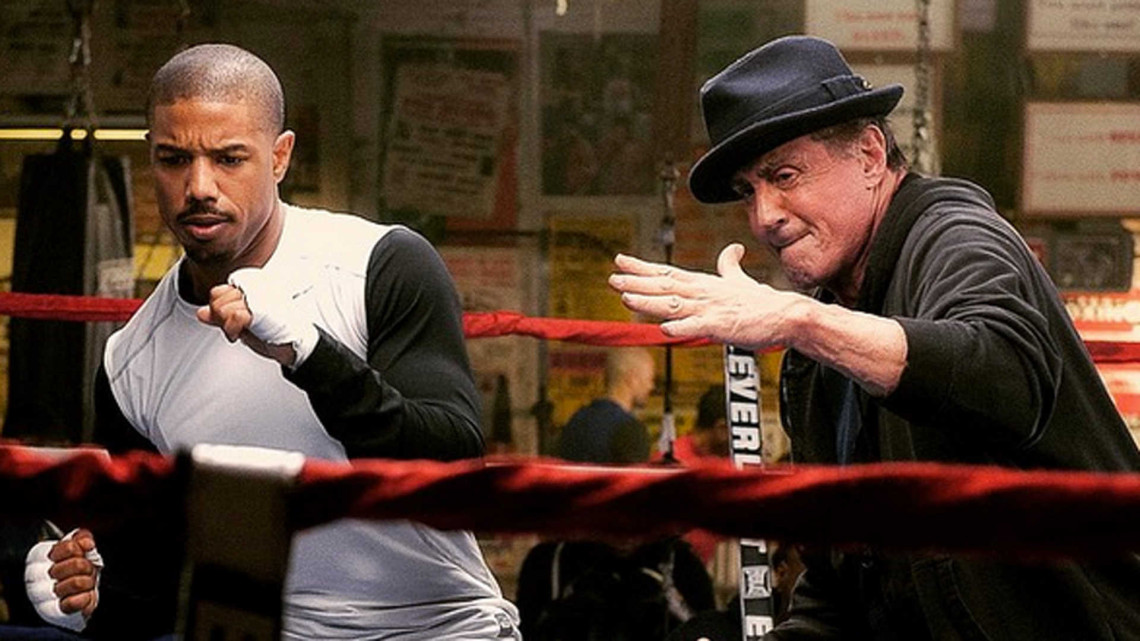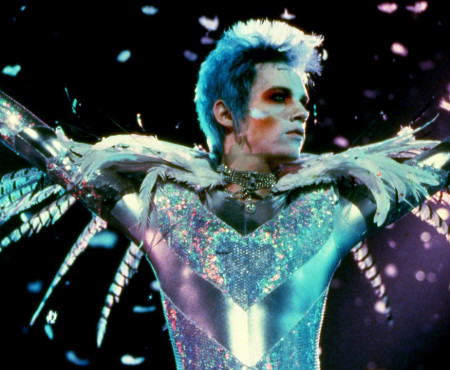The most frustrating aspect of this summer’s Fantastic Four—aside from a poor script, spotty authorial oversight, scads of exposition that went nowhere, Kate Mara’s hilarious wig, and approximately 527 other things—was its gross misuse of one Michael B. Jordan. The superhero non-tentpole was supposed to be the young actor’s grand arrival to the A-list—the high-profile role that’d clue the rest of the world into the sensitivity and toughness that he displayed in Ryan Coogler’s little-seen indie Fruitvale Station. Unfortunately, the movie gave him little to do other than make the occasional wisecrack while standing around looking serious. Fantastic Four turned out to be a waste of Jordan’s time, but he’s got no reason to be down about it. The film that confirms him as one of the most exciting emerging talents in screen acting has come at last. As Creed’s rough-hewn boxer Donnie “Adonis” Johnson (née Creed), Jordan is granted another career-making role by Coogler. And this time, the platform is big enough for it to work.
At 28 years of age, Jordan plays Adonis as an inexperienced rookie who’s paradoxically seen it all. A childhood spent bouncing in and out of juvenile detention facilities and foster homes thickened his skin, until he was taken in by the widow of his daddy (Phylicia Rashad), Apollo Creed, and raised as her own. By the time Adonis leaves his caretaker’s L.A. home and shoves off for Philadelphia to pursue his destiny as a boxer, his shoulder is made up almost entirely of chips. Jordan amply conveys that he’s not comfortable with his namesake—both because he feels pathologically driven to cement his legacy for himself and because he’s still coming to grips with a childhood bereft of any presence from his biological parents. Whenever Adonis steps into the ring, he bears the hefty weight of emotional baggage. This depth of development comes as a surprise both for a character of his relatively early age, and for an extension of the Rocky film franchise that many diehard fans felt needn’t exist.
Thank goodness cooler heads prevailed and pushed Creed through into production. The film could not be further from a reheated cash grab—or worse, an unimaginative African-American-focused Rocky re-do. Every aspect of the film feels understood, labored-over, and executed with sincerity and care. Coogler brings the same specificity of setting that he brought to the streets of Oakland in Fruitvale Station to Philadelphia here; he understands which neighborhood goes where, how to dress a steak sandwich, and the urban-dictionary definition of the regional word “jawn.” Adonis’ romantic subplot with the self-styled FKA twigs-lite chanteuse downstairs (Tessa Thompson), such a frequent stumbling block with sports movies, unfolds believably without eating up too much of the film’s somewhat unwieldy two-plus hours. Coogler’s fluid camerawork sometimes encircles his subjects a few revolutions too many, but for the most part it creates visually coherent fight scenes guaranteed to raise your heart rate. It’s no surprise that rumors of full-throated cheers from audiences in test screenings have crept across social media in recent weeks.
But Creed’s greatest strength has emerged, all too appropriately, from what was once feared would be its main impediment. Reprising the role to which he owes his entire career, Sylvester Stallone has one last go-round as Rocky Balboa, and you bet your ass he looks old. The man looks downright igneous, more rock formation than human man; at first, this is played off as a source of expected comedy. For example, Adonis entertains the idea of dubbing him OG for short, denoting “Old-Ass Gangsta”. But Balboa’s story branches off to become a horse of a different, decidedly more tragic color in short order. By trotting out an aging movie star many suspect is well past his prime to portray a broken boxer in the same situation, Coogler enables himself to sneak in some poignant sucker-punch meditations on aging and mortality.
The parallels between the story Creed tells and the film itself are so clean that they could’ve only been drawn up by a cunning screenwriter. Just as Adonis strives to simultaneously do right by his father’s legacy while getting out from under its shadow, Creed makes for a fine entry in the Rocky franchise while accomplishing so much more. Coogler sidesteps almost every cliché stuck to boxing movies and films boasting black leading roles. Adonis didn’t have to fight his way out of poverty—his foster mother provided him with everything he ever needed. His film floats like a gritty character study and stings like a brutal boxing drama, landing its every blow right on the target and exerting enough force to leave a bruise that’ll last for weeks.




















